Nailing the Thesis
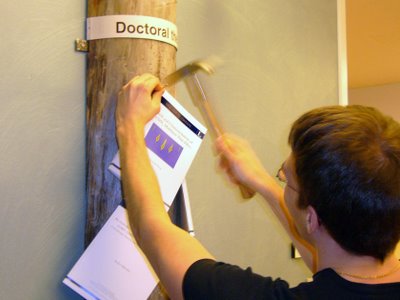
Yesterday I went to my second 'thesis spiking' ceremony. This is where a soon-to-be doctor takes a hammer and a nail to his years of hard work and impales it onto a stake in the library.
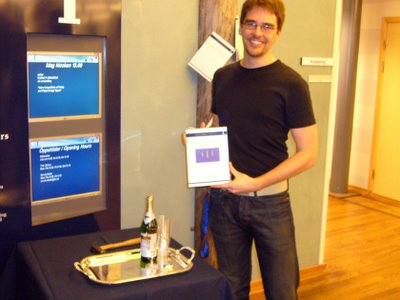 Hasse with the finished masterwork. Non-alcoholic champagne (grape juice), hammer, and bronzed nail provided.
Hasse with the finished masterwork. Non-alcoholic champagne (grape juice), hammer, and bronzed nail provided.
Hasse and Johanne are the two senior PhD students in the division, and are defending their theses in a couple of weeks. The postgrad system is quite different over here to that back home, and acutally will change to be more uniform across Europe. In fact the whole school system is quite difficult to understand, especially due to some linguistic confusion for English speakers.
School starts with grundskolan which starts from the age of 6 (a bit later than home) and goes up to year 9. Then students go to gymnasiet, or 'gymnasium', which has nothing to do with trampolines and forward rolls. But tertiary education is called högskolan (literally 'high school'). As you could image a discussion of Nadia Comaneci's education gets very confusing to follow.
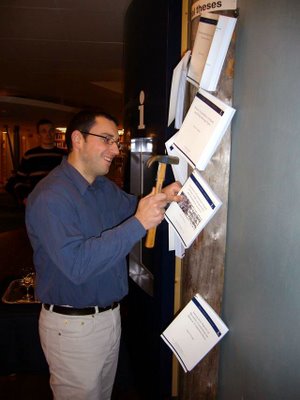
There are 2 levels of graduate degree from a university; 'bachelors' and 'masters', which kinda correspond to an aussie diploma (ie from TAFE) and a bachelors degree respectively. So if you proclaim you have a bachelors degree over here, it might not be as impressive as you'd hope. Their final year project is called their "diploma thesis' which is needed for their 'masters degree". Following this a widespread European requirement is to do 6 month's work experience / internship which is called 'ex-jobb', and is required before you start working. Oj.
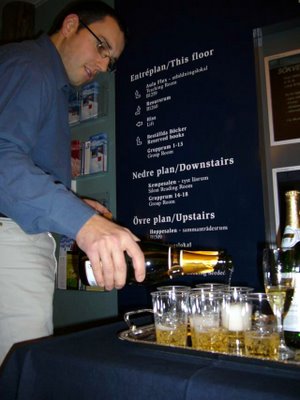 The Frenchman provided real French champagne this time, from Epernay in Champagne (via Systembolaget in Sweden, of course)
The Frenchman provided real French champagne this time, from Epernay in Champagne (via Systembolaget in Sweden, of course)A postgraduate student here is actually a salaried employee of the university,paying taxes, and making superannuation(-like) welfare contributions and therefore eligible for unemployment benefits if they don't find work when they finish. They have a certain proportion of time allocated for teaching/supervision, and must also take a lot of coursework. Frankly I am amazed that the research gets done here, considering how much time is spent on other things.
After about 2.5 years, they then have a intermediate exam called the Licenciate. This is more, rather than less, than an aussie Masters, but not by much. But the Lic in engineering is more accepted in Europe than a Masters is back home. Then, they can continue on to a PhD.
The PhD is in the 'journal papers' format, so they don't write such a huge chunky monograph. Soft bound, double-sided and single spaced; hundreds of copies might be printed and distributed to libraries, friends, anyone. The Lic and the PhD is defended publicly, first with a presentation of the research, then an interrogation by the designated 'opponent', and a bank of 'points judges' basically hold up signs after every question with their scores. The defense is fully open to the public, so questions can literally come from left field. Friends and family turn up, often in kostum (suit and tie). After this of course comes a big 'fest'
It is all a bit more ceremonial than my thesis submission, which was very anticlimactic. After sleeping for a week or so in between handing the thing over to the bookbinder and getting it back, I took the massive tomes to a nondescript office in the admin building at uni, signed a form and hand the things over. I could have paid to have a photo taken at that point and receive a balloon. The theses then might sit on a desk for a couple of weeks waiting to be sent to the examiners. You just wait for the message from your supervisor 5 months later saying that the examiners have finally got around to reading it, given some comments, and after adding a few minor Errata you can finally bring out the white coat and stethoscope and call yourself. Dr.
I don't know much about the graduation ceremony except this: top hat and tails are required. The swedes are polar in their formality - it is either casual (work 'formal' is usually jeans, shirt, and a suit jacket at most), or really really formal. Going out involves more shirts and ties than it does back home (see post about NY eve last year). So at the graduation, top hat and tails are required. Could you imagine the chaos that would be had at a graduation from a magician's school...

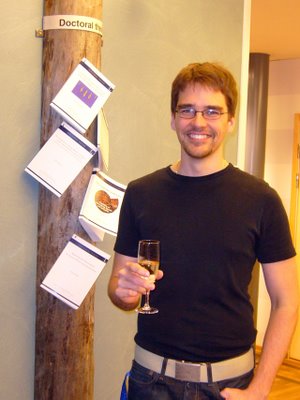



0 Comments:
Post a Comment
<< Home